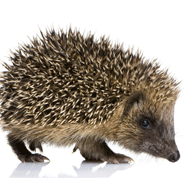Diphtheria-like infectious agent found in hedgehogs

Scientists identified Corynebacterium ulcerans, a close relative of diphtheria, in hedgehogs.
Scientists have discovered the first evidence of a diphtheria-like infectious agent in hedgehogs, prompting a warning to vets in close contact with wild animals.
A study led by the National Consiliary Laboratory for Diphtheria in Germany identified Corynebacterium ulcerans, a close relative of diphtheria, in hedgehogs.
Diphtheria is rare in countries with high immunisation coverage, but Germany has seen a rise in C ulcerans infections.
The research team concluded that the infectious agent occurs in a variety of animal species with or without disease symptoms and there are clear transmission events between infected pets and their owners.
While case numbers are low, the risk should raise public health awareness of these emerging infections, they said.
Those who work closely with wild animals, such as vets and those working in wildlife sanctuaries, were advised to take extra hygiene precautions, including adequate, up-to-date vaccination and good hand washing practices.



 The Veterinary Medicines Directorate (VMD) is inviting applications from veterinary students to attend a one-week extramural studies (EMS) placement in July 2026.
The Veterinary Medicines Directorate (VMD) is inviting applications from veterinary students to attend a one-week extramural studies (EMS) placement in July 2026.